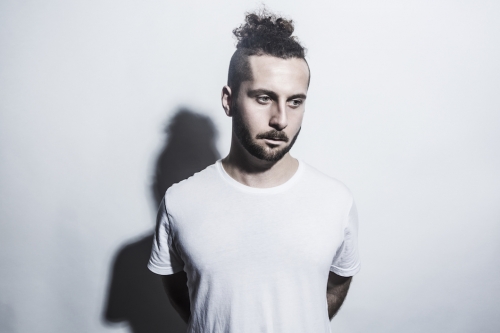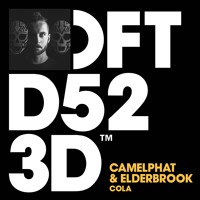Over the last few years we’ve covered several tracks from the London artist Elderbrook as he’s climbed the EDM ladder to stardom. With tens of thousands of listeners worldwide, his following continues to grow—and for good reason. While his sound certainly takes from much of the club music that has come before, you can hear him sliding into downtempo pop, bits of R&B, and even some darkwave. Not only does he get your body swaying, he also captures your attention.
His biggest claim to fame yet came when his recently released single “Cola,” a collaboration with the electronic duo CamelPhat, was nominated for a 2018 Grammy. Rolling Stone called it one of last year’s “stealthiest and most vital dance records.” The music video is the best kind of daydream—psychedelic and demonic.
Elderbrook is currently on a North American tour, accompanied by the chillwave artist Imagined Herbal Flows. I had the opportunity to speak with him over the phone before he had to rush off for a sound check—in just a few hours he’d be headlining a show at the Knitting Factory in Brooklyn, NY.
Indie Shuffle: So much of your work is refreshing. While your songs are very much in the realm of EDM, they’re not overshadowed by the kind of heavy drums and bass we see from so many EDM artists. You seem to find a great balance with your songs. Could you talk a bit about your process as a songwriter?
Elderbrook: Oh, thank you. I think one of the reasons why it does sound a bit different than a lot of the EDM stuff is because I come from an indie rock background. A lot of electronic producers will go for a specific bass or drum sound, whereas I approach it from a more indie and a more alive perspective.
With songwriting, it can be anything really—I try to get something that sounds a little bit different. Once I’ve got something I like, I just roll with it until I’ve got a finished song in front of me. It’s a lot of trial and error. It’s a lot of trying new, weird methods. A lot of the time they don’t work, and a lot of the time they do. The most important thing for me is realizing what does work, keeping that, and moving onto the next thing.
Lyrically speaking, phonetics are really important to me. When it comes to getting lyrics together, I’ll mumble what I think it should sound like, and then I’ll apply words to that. Once I’ve got a cool phrase, I’ll try to build the story around that phrase. The lyrics almost write themselves—a story just emerges out of it.
You’ve been making music since you were 16, which is already impressive. But what’s more interesting to me, given what you’re doing now, is that you got started in the rock scene. Can you share a bit about your origins?
When I started I was about 15 or 16 I got a guitar, I started playing— turned out I was a little bit better than all my friends who were playing guitar. So, I put a band together. We weren’t amazing, but I learned a lot working with other people, making songs, getting together on stage, being shit on stage, getting better on stage. Eventually, I went back to just myself. It was just me and a guitar. When I started recording music with my guitar and me singing, I had to use a computer. And once I started figuring out how to manipulate sounds on a computer, it all morphed into a way more electronic project. That’s what’s led us to here.
Do you spend a lot of time behind a computer, or do you rely more on real instruments?
It’s half and half, really. I produce myself, so I am in front of the computer recording. But I play a lot of guitar, I play bass, I play drums, I play piano. It’s whatever I’m feeling really. The beauty of being able to do both is that I can record a piano or a guitar, and once it’s in some recording software, I can then manipulate it until it sounds like something completely different—it’s combining the best of both worlds.
There obviously is a lot of time and patience involved when you’re sitting down in the studio to create your work. What changes when you’re performing in front of an audience?
Obviously, when I play live, I take aspects from what I’ve made in the studio and bring them to the stage. I involve a lot of looping and MIDI—I’m playing synths, I’m playing an MPD. I’ve got an SPD-SX—a drum machine—that I like to get funky on from time to time.
Your recent release, Talking, has so much variety. You have songs on there like “Woman,” which seems very much like club music. But then you have “Feels Like a Sunday,” which feels a lot rawer—almost on par with Francis & The Lights. Are you consciously shifting between different sounds?
To be honest, the fact that there’s a lot of variation in my sound is not intentional. It’s just because I love listening to so many different genres in music, so I wouldn’t want to only create one genre. That wouldn’t really make sense to me. There’s flavors of gospel with “Feels Like a Sunday” or “I O U.” But then again, there’s some definite hip-hop elements in “Woman” and “Put It Down.” And then there’s obviously the more club-ier ones, like “Talking” and “Let Go.” These are all genres that I love listening to. I wouldn’t want to constrict myself to the boundaries of one genre.
So do you have any specific influences?
There’s so, so many different influences. From a vocal-technique point of view, I love artists like Sam Cooke and Etta James. From a production perspective, I love Jamie xx and Mura Masa. From a lyrical point of view, I take inspiration from the indie bands of the 2000s, like The Strokes, Kings of Leon, Arctic Monkeys—people like that. I just get little bits from all over the place and mash them all together until they sound good.
Are you taking your sound in any particular direction at the moment, or do you create more organically?
The stuff I’ve been working on recently is a little more electronically driven—I guess that’s where my head is at the moment. I don’t really go into writing with an intention of it sounding like anything. I try to just make it make itself. I just do what feels right.
So let’s talk about “Cola”—did you think it was going to blow up like it did? Are you enjoying all the attention you’ve been receiving around it?
CamelPhat and I were making the song in January of last year. We made about three songs in one day. At the time, we really didn’t think much of the song. But two months later, when Defected Records wanted to sign it, we were like, ‘ok, sure, that’s fine.’ We started listening to it a bit more, and it made a little bit more sense each time. We loved it, but we just didn’t think it was going to connect with people in the way that is has—because on paper it’s weird. It’s basically just a siren for three minutes with me whispering vocals over the top about Coca-Cola, which just sounds super random. But for some reason it worked. And I’m really enjoying everything that’s happened with it—it’s been crazy. I was in New York last week for The Grammys, which I never thought in a million years I’d be able to do, so I feel very lucky.
Did you and CamelPhat know each other before this? Do you think you’ll continue collaborating?
No—we had this one session about a year ago, we had four hours, made a couple tunes, and then we went our separate ways! We didn’t really see each other until the song blew up. The next time I saw them was at the Grammys.
What kind of future projects do you have in store?
I’m always writing. I’m building up what I hope will eventually become an album. I think I’m aiming to finish within the year. I’m just going to keep on writing. When it makes sense, I’ll realize what it is. Like I said, I don’t want to go in with the intention of doing anything. I’d rather something happen naturally, and I’m sure it will because I’m writing everyday. I’ve got so much music saved up—I’ve got a lot of demos, I’m working with a lot of cool producers. So we’ll just see what happens. I have no doubt that at some point soon the album will jump out as being finished—out of absolutely nowhere.
Where does the name Elderbrook come from?
Ah—do you know who Reggie Watts is? Do you know when he was doing his standup for Netflix? Do you know when he was doing all those different impressions and accents where he’s just rambling on without ever coming to a conclusion? He was taking the piss out of an English accent. He was listing loads of English-sounding names until he said, ‘introducing the lovely and talented Lady Elderbrook.’ I was like, ‘yo, if I was called Elderbrook, I would sample the shit out of that.’ I looked it up, and no one was called Elderbrook, so I changed my stage name.
Image Credit: Fiona Garden


